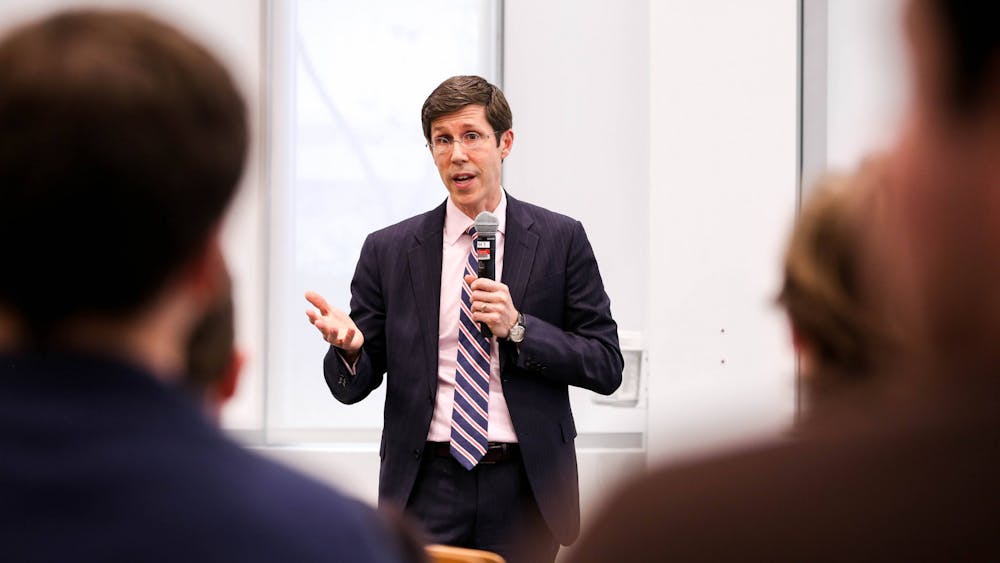Providence Mayor Brett Smiley discussed ongoing negotiations of Brown and other non-profit institutions’ voluntary payments in lieu of taxes, the city’s housing crisis and public safety in a moderated conversation in Stephen Robert ’62 Hall Tuesday evening.
The event — organized by the Brown College Democrats and sponsored by the Brown Political Review and the Taubman Center for American Politics and Policy — aimed to provide Brown community members and Providence residents an opportunity “to hear directly from the mayor about his vision for the future of Providence and the role Brown can play in creating a better Providence,” according to the Taubman Center’s event page.
The conversation was moderated by Brown Dems Vice President Noah Rosenfeld ’24 and began with a discussion of the renegotiation of the University and the city’s voluntary payments agreements, which will expire this June. Brown, the Rhode Island School of Design and other non-profit institutions in Providence do not pay property taxes, instead paying a fraction of what they would pay in taxes to the city through a 2003 memorandum of understanding and a 2012 memorandum of agreement.
Smiley said that the push to increase revenue from tax-exempt institutions has been a “major issue” for his administration, adding that his office is trying to “reimagine and reframe the debate” around the payment agreements. While he noted that Brown and other institutions “should be paying more,” Smiley also acknowledged that they are essential to the “vitality” of the city.
In addition to renegotiating these payment agreements, Smiley discussed other ways the city can “get compensated” by these institutions. He pointed to opportunities for both Brown and RISD students to volunteer in Providence public schools, as well as a legislative proposal by his administration that would grant the city 25% of the payroll tax received from new employees of these institutions.
“We can actually encourage (these institutions) to add jobs, instead of fighting their growth as we do now,” Smiley said.
The mayor also addressed the city’s housing shortage, telling the audience that “we need more housing” of all types across the city. Smiley added that he supports increasing density in parts of the city to meet housing needs in Providence, and plans to do so in the rewriting of the city’s Comprehensive Plan, which informs development, land use and strategic goals for the municipality.
Smiley acknowledged the role of universities in perpetuating the housing crisis, as an increase in students living off-campus can encourage landlords to convert single-family homes into apartments, potentially displacing local residents.
“Part of the solution is these institutions taking responsibility for their growth,” Smiley said, contending that universities in Providence need to invest in more on-campus housing before increasing enrollment.
The mayor also discussed his approach to public safety. Smiley noted that not all Providence residents feel safer when they see a police officer, leading him to acknowledge that “police need to be part of the solution, but not the entire solution” when addressing public safety concerns.
Smiley emphasized the need for community input in policing. He pointed to one of his first actions as mayor, which was leading a community-driven search for a new police chief. His administration conducted surveys to gather community input and then held an open forum with selected candidates before ultimately choosing Commander Oscar Perez to fill the role.
According to Smiley, his passion for local government stems from his belief that it “impacts people’s lives most directly.” Since taking office in January, he has focused on pursuing “tangible, practical” changes that can make a real difference in the lives of Providence residents — and that makes his job “fulfilling,” he said.
Mary Shepard, an East Side resident, said that the event was the first time she had heard Smiley speak since he was elected as mayor. “I am so delighted with this mayor and that he (is holding) a community event,” she said — though she wished that Smiley had spent more time addressing his plans to revitalize Downtown.
Sharon Steele, president of the Jewelry District Association, said she attended the talk to hear how the mayor approaches the city’s relationship with the University.
“In my world, Brown is our partner, and I am interested in hearing the mayor speak to Brown on the issues we are all dealing with on a daily basis” in the Jewelry District, she told The Herald.
“The relationship between Brown and the city of Providence is both extraordinarily long and extraordinarily complicated,” Rosenfeld said. “From our perspective, it was crucial to hear from the mayor directly about Brown's role in the community — what we can do as Brown students to be active citizens in Providence.”
The conversation “was a fantastic opportunity to hear from an elected official (and) to talk about … how Brown can play a more pivotal and active role in creating a better Providence for everyone,” said Cecilia Marrinan ’24, president of Brown Dems.

Sam Levine is a University News editor from Brooklyn, New York covering on-campus activism. He is a senior concentrating in International and Public Affairs.





